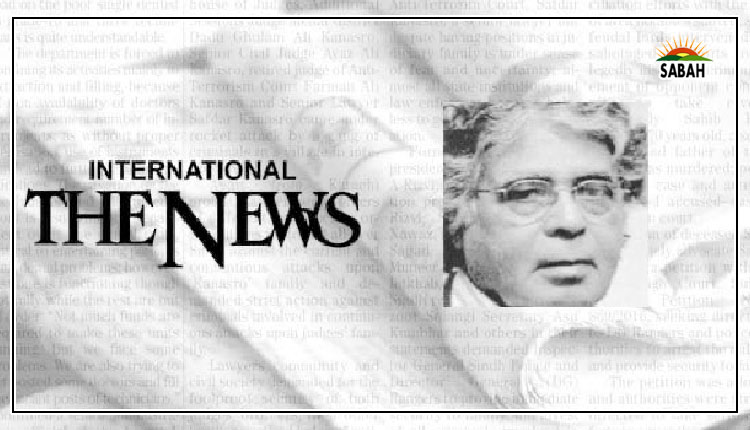Revolution made easy…Ghazi Salahuddin
One more time, Imran Khans party mobilized its forces to attack the citadel of power. Fridays march on Islamabad will continue to make headlines during the weekend. There was more action on the ground than in previous rallies. Protesters clashed with the police. Tear gas shells were fired. Arrests were made.
What dire consequences will this protest bear? The timing of this protest and the moves that are being made by the ruling coalition, including stratagems adopted to carry out an amendment to the constitution, ensure that the political temperature will rise, and big decisions will be made.
One indication of this was the notification, issued late on Friday night, to deploy army troops in Islamabad under Article 245 to ensure law and order during the Shanghai Cooperation Organisation (SCO) summit. The Pakistan Army will be deployed from October 5 to 17. This means that the troops will be there right away, during the aftermath of the PTI protest.
Meanwhile, one should expect no letup in the PTIs feverish aspiration to overthrow the present ruling arrangement and bring about a revolutionary change in the countrys politics, without apparently having any clue as to what it would be. An initial objective, of course, is to build up enough pressure to get the leader out of prison.
There is little doubt that PTI has a large popular support in the country. But these supporters do not obviously constitute a revolutionary cadre. For that matter, Ali Amin Gandapur is simply not the commander you want on a battlefield. Besides, a revolution is not something that you can wrap up in weeks or even months. Yes, a dharna would be an easier assignment.
It is interesting that every time the PTI proposes a protest or a long march or a show of force in whatever manner, the professed resolve is to sweep all opposition aside and this opposition is verily the powers that be. It is true that the playing field is not even for the party. Stringent measures are used to keep a check on its potential to launch an agitation.
The point here is that PTI firebrands repeatedly brag about their ability to overwhelm all the fortifications of the adversary. You only have to see some clips of Ali Amin Gandapur and a few other hardline leaders of the party to understand a certain mindset that prevails in the party. It is Imran Khan himself who sounds the bugle.
On September 8, during a rally in Islamabad, Ali Amin Gandapur, who also holds the respectable position of the chief minister of Khyber Pakhtunkhwa, issued an ultimatum to the federal government: release Imran Khan within two weeks or he would himself lead the march to take his leader out of the prison. Could he be saying what he really didnt mean?
One may be amused to see here an allusion to the storming of the Bastille by revolutionary insurgents as the turning point in the French Revolution on July 14, 1789. The Bastille was a fortress and a political prison.
Well, the French Revolution was a long time ago and political leaders and workers may not have studied it in detail. But a direct reference is made to what happened in Bangladesh on August 5, two months ago. Students led the campaign against the repressive government of Sheikh Hasina Wajid, forcing her to quit as the prime minister and flee to India.
This dramatic development, which can be billed as a revolution, had inspired some PTI leaders to hope for a similar movement in Pakistan. Remarks were made that Shehbaz Sharif would not be able to flee from Islamabad in a helicopter. That Bangladesh is really seen as an example was confirmed on Thursday, on the eve of the march on Islamabad. PTI leader and former president Arif Alvi said that the situation here could become similar to that of Bangladesh.
How well do we know about the situation in Bangladesh? Sadly, our media has not been covering the developing situation in a country that was once a part of Pakistan. One month ago, the interim government gave magistracy powers to commissioned army officers for 60 days, to try to improve law and order. It means that an army officer can arrest people and put them in custody. He can open fire when he finds it necessary.
Incidentally, I have another excuse this week to try to figure out what a social revolution can be. On Tuesday, China celebrated 75 years of its revolution. In a speech made on Monday to mark this historic occasion, Xi Jinping, President of the Peoples Republic of China warned of rough seas ahead for the Chinese people.
It is really intriguing that though we look at China as a dear friend and we share borders with this great country even our educated people know very little about Chinas history or its culture or traditions. Its revolution in 1949 was the result of an armed struggle that lasted for more than two decades.
As an aside, let me point out that the idea of a long march is loosely derived from Chinas revolutionary history. How casually our leaders announce a long march and how short it always is. Chinas Long March was in fact a military retreat. It covered 4000 miles and the journey took two years.
It was Mao Zedong, leader of Chinas revolution, who said that revolution is not a dinner party. It is an insurrection, an art of violence by which one class overthrows another.
Which class would want to overthrow which other class in Pakistan? Where is a revolutionary party in Pakistan and what ideas would it prescribe to create a new social order?
These are difficult questions and our leaders should not be burdened with the responsibility of answering them. But the irony here is that Pakistan does seem to be in a revolutionary situation. In a divided society, we all tend to agree that things are falling apart. It is a society desperately seeking a revolution.
Courtesy The News












